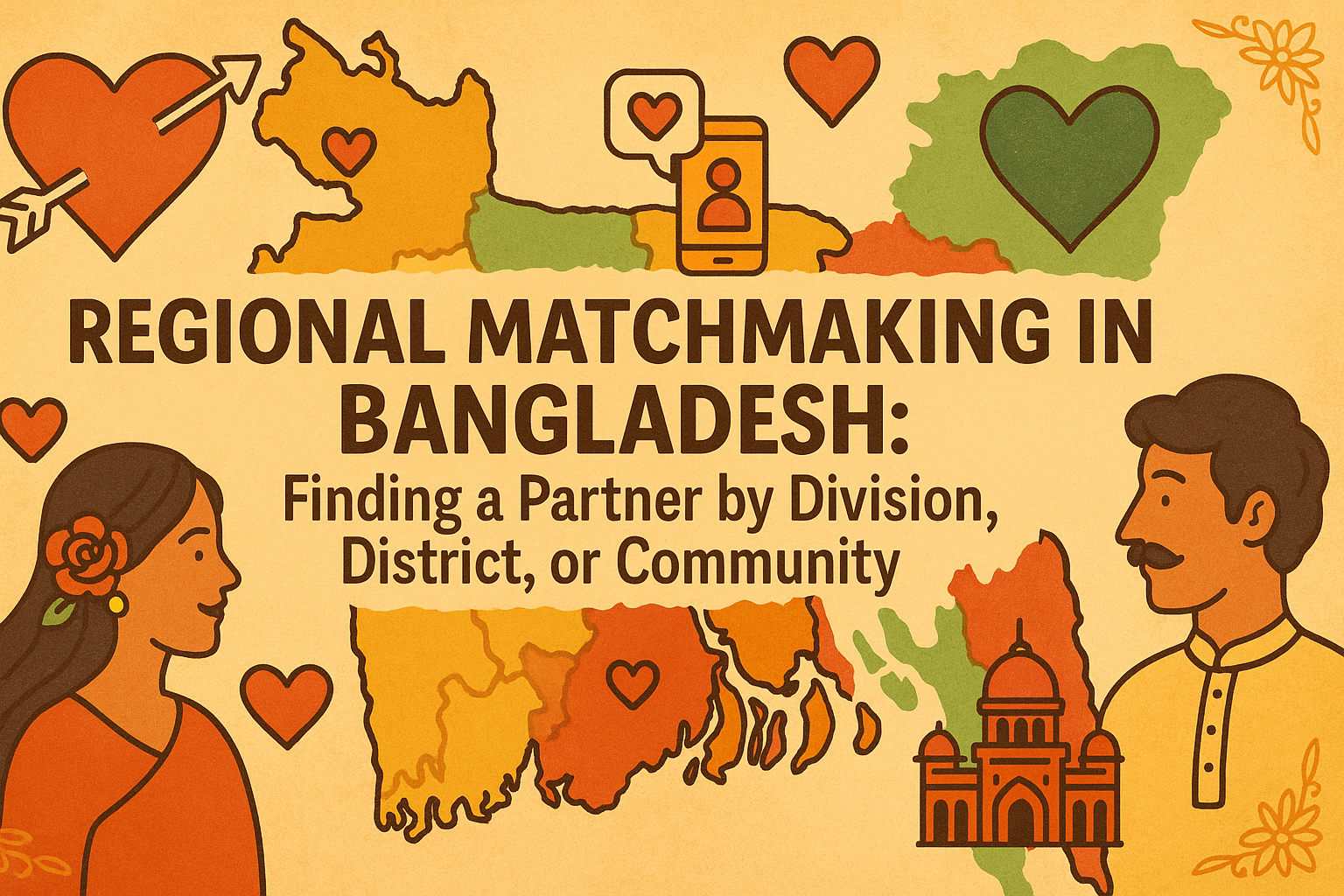
Regional Matchmaking in Bangladesh: Finding a Partner by Division, District, or Community
Introduction
In Bangladesh, where the debate over the best type of rice
can spiral into a national referendum, finding a life partner is understandably
nuanced. From Barishal’s poets to Sylhet’s tea gardens and Chattogram’s sea
breeze, regional matchmaking isn’t just a strategy—it’s a cultural rite of
passage. Whether you're trying to decode your bubu’s district dialect or avoid
accidental culinary shock (“You put what in biryani?”), choosing a match
by region, district, or community isn’t just about geography—it’s about
harmony.
Why Region Matters in Bangladeshi Matchmaking
Regional matchmaking is more than just a location pin on
your biodata—it’s a lifeline to shared traditions, familiar cuisines, and
dialects that won’t need subtitles. A match from your own division or district
often means:
- Cultural
alignment: From shared values to matching wedding rituals.
- Language
ease: Because love is easier when your partner understands your rants
in local slang.
- Parental
peace: Families often feel more comfortable with a “known”
region—especially when dowry debates are involved.
Let’s be honest—no one wants to Google their in-laws’
dialect post-marriage.
Understanding the Geography of Love: Divisions & Districts
Bangladesh is beautifully structured into 8 divisions and 64
districts, each with its distinct vibe:
- Dhaka:
Fast-paced, career-focused, and sometimes accused of turning weddings into
corporate events.
- Sylhet:
Where romance might come with a side of “Sylheti tea stall proposal
tales.”
- Rajshahi:
Artsy, mango-obsessed, and refreshingly grounded.
- Chattogram:
Beach views, bold accents, and unmatched seafood courtships.
- Khulna,
Barishal, Rangpur, and the up-and-coming Mymensingh
and proposed Comilla/Faridpur divisions all bring their own flavor
to the matchmaking feast.
These regions offer more than a postal code—they reflect
deep-rooted identity, lifestyle preferences, and even expectations from a
spouse.
District-Based Matchmaking: A Local Affair with National Appeal
The appeal of finding someone from your district? Let’s
break it down:
- Shared
customs: Be it the wedding entrance song or the correct way to eat
shutki.
- Mutual
networks: “Oh, you’re from Netrokona? You must know my cousin Shobuj
bhai’s tailor!”
- Minimal
surprises: Especially during kabin-nama negotiations.
And yet, many are crossing borders—district-wise, that is—to
find their match. Inter-district marriages are growing in popularity, driven by
online matchmaking platforms and adventurous souls who fall for a dialect
different from their own. Love truly knows no upazila.
Community-Based & Religious Matchmaking: Tradition Meets Modern Tech
In Bangladesh, religious and community alignment still plays
a pivotal role. Whether you’re:
- Muslim,
Hindu, Christian, or Buddhist,
- From
the Marma, Chakma, or other ethnic groups,
- Or
simply passionate about preserving your cultural practices,
Community-based matchmaking allows couples to stay rooted
while embracing romance. Shared festivals, values, and family expectations form
a bridge—especially in a country where marriage is seen as a family merger.
Matchmaking Platforms That Let You Filter by Region
Modern problems require modern solutions—and yes, digital
matchmaking platforms are all over this trend. You can now filter prospects by:
- Division,
district, upazila
- Religion,
caste, community
- Education,
job, NRB status
Gone are the days of asking aunties to “keep an eye out.”
Now, apps and websites give you potential rishtas with location filters sharper
than GPS. Swipe, scroll, filter, and maybe even stumble into your soulmate
while searching “Dhaka Engineer, Sunni, Non-Smoker.”
Tips for Regional Matchmaking Success
Let’s say you’ve narrowed it down to a district. Great! Now
keep these pro-tips in mind:
- Do
your homework: Learn about their local customs—yes, even the wedding
songs.
- Respect
dialect differences: That “adorable” accent may one day be what your
kids pick up.
- Filter
smartly: Use online tools to refine—not restrict—your search.
- Stay
open-minded: Inter-district marriages might require compromise, but
they can also lead to beautiful fusion.
And for goodness’ sake, know whether your potential in-laws
eat ilish or rui during Eid.
Subtle Humor & Cultural Quirks
Let’s admit it—regional preferences are sometimes
hilariously specific. Like:
- Sylheti
aunties asking if you can handle their spicy pickles.
- Chattogram
grooms subtly flexing their sea-view family home.
- Dhakaiyas
treating Mirpur vs. Dhanmondi like a cross-border marriage.
Yet, these quirks are what make love stories in Bangladesh
so rich. A Barishali bride and a Rajshahi groom may argue over mango
superiority—but that’s just foreplay, really.
Conclusion
Regional matchmaking in Bangladesh is less about drawing
lines on a map and more about drawing connections through shared identity.
Whether you find love in your own district, across a river, or in a neighboring
division, remember: the most meaningful matches are those built on
understanding, compromise, and perhaps a shared love for mishti.
So whether your heart beats to the rhythm of Dhaka’s honks
or the calm of Rangpur’s breeze—your perfect match might just be one division
away.
FAQs
Q: What is regional matchmaking in Bangladesh?
A: It’s the process of finding a life partner based on shared geographical
origins—like division, district, or community.
Q: Why choose a partner by district or division?
A: For cultural compatibility, family comfort, and familiarity in customs and
dialect.
Q: Are inter-district marriages common in Bangladesh?
A: Increasingly so! Especially with online matchmaking tools bridging regional
gaps.
Q: Do matchmaking platforms allow filtering by region and
religion?
A: Absolutely. Most reputable sites now let you refine searches by division,
district, religion, and even job or NRB status.